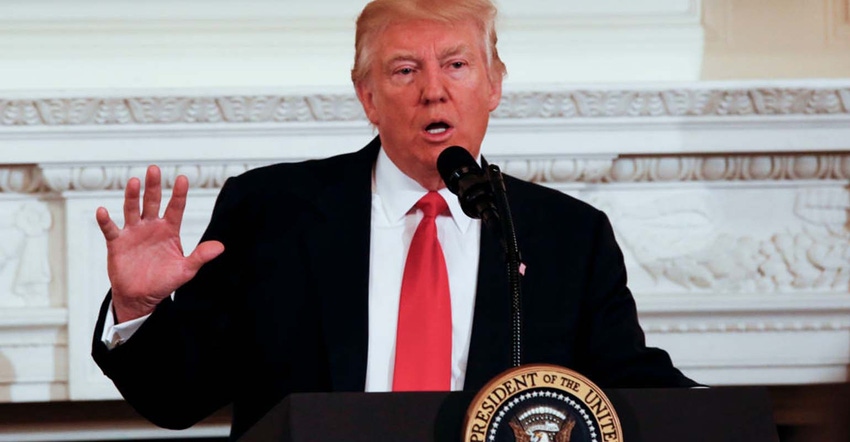
by Jennifer Jacobs and Alan Bjerga
President Donald Trump promised U.S. farmers that they will emerge from a trade dispute with China better off despite threats from Beijing to impose tariffs targeting American agricultural products.
“There’ll be a little work to be done, but the farmers will be better off than they ever were,” Trump told reporters Monday during a cabinet meeting at the White House.
China last week announced $50 billion worth of tariffs on American products including soybeans and pork in retaliation for Trump’s plan to impose duties on 1,333 Chinese products. The biggest potential impact will be in rural areas that long have been part of the Republican base. Eight of the 10 biggest soybean-producing states went for Trump in the 2016 election and three of those will feature close Senate races in November.
The Chinese “hit the farmers specifically because they think that hits me,” Trump said Monday.
“I wouldn’t say that’s nice, but I tell you our farmers are great patriots,” Trump added. “They understand that they’re doing this for the country. We’ll make it up to them.”
Agriculture has formed part of the bedrock of the president’s support, but economic pressures are growing. Farm profits may reach a 12-year low in 2018, according to a forecast the U.S. Department of Agriculture released before the Chinese tariff threat.
Soybeans, the second-most valuable U.S. crop after corn, would be especially hard-hit -- exports to China accounted for more than one-third of the oilseed’s revenues last year. Farmer organizations including the American Soybean Association have called the impacts of tariffs on agriculture "devastating," even as farmer supporters of the president have taken a more wait-and-see approach.
"Farmers and ranchers can be on the tip of the spear when it comes to a retaliation," said Steve Censky, deputy secretary of the USDA, in remarks before an organization of agricultural journalists on Monday. "We’re working at USDA to take a look to see what kind of actions are needed."
One possible option could be using the department’s authority under the Commodity Credit Corporation, a federal entity that funds farm subsidies, to buy surplus U.S. crops. Using such authority to intervene in markets is rare, but not unprecedented. Under President Barack Obama, the USDA bought surplus pork to keep up prices during a drought that caused producers to send animals to slaughter early, boosting supply.
Censky said surplus buys are possible. "We have a pretty broad authority," said Censky, who was previously the head of the soybean association that’s now protesting the administration’s stance toward China. "There are a number of actions we could use," he said, without committing to a specific plan.
Related: American Soybean Association calls on Trump to reconsider Chinese tariffs
To contact the reporters on this story: Jennifer Jacobs in Washington at [email protected]; Alan Bjerga in Washington at [email protected]
To contact the editors responsible for this story: Alex Wayne at [email protected]
Mike Dorning, Joshua Gallu
© 2018 Bloomberg L.P
About the Author(s)
You May Also Like




